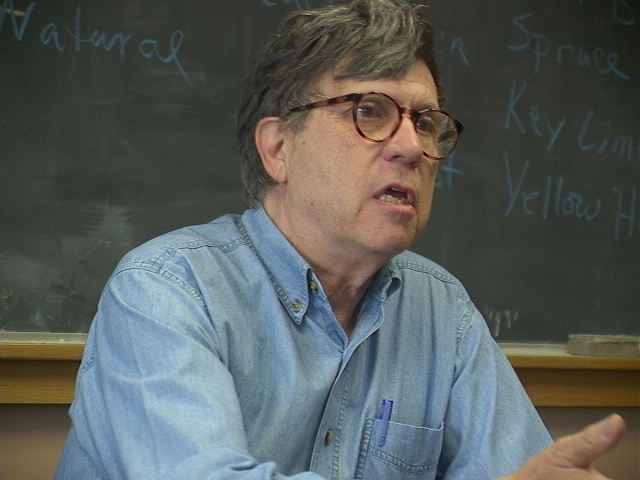 “I hope my films leave a feeling of anger”
“I hope my films leave a feeling of anger”
Ken Loach
Interview by Marina Kabat (CEICS – Razón y Revolución)
Published in El Aromo, september 2008
You have defended the Trotsky-Breton manifest and trotskist idea that the party shouldn’t have a determine position in art. That is that the party and the artist should be separated. However, you have also asserted that the social responsibility of the artist. Isn’t it a contradiction?
No. I think it doesn’t. That the fact that the party should not have a position as regard to art I think it’s not the same that the artist should not be a member of the party or politically engaged. These two things are not the same. I think that the party shouldn’t have a position on artistic matters, it means that the party, I guess if there were to be such a party again, should not promote one particular kind of work form weather it be social realism or expressionism or what ever. I think that art is individual have to decide. But I think is quite proper for artist or writers or musicians to be engaged politically. And I don’t think two things are contradiction.
The artist, as anyone else, is on a certain class relation. Why should the party give him more freedom that it gives to other people? And why shouldn’t the party force him to define a field on the battle field?
Because imagine what you’d do if you cage a bird. If you cage a bird they can’t fly. I think in a way we all must lock to the back and see what kind of party are we looking for and what idealistically is a party that we can do in the 21st century that in the western countries. From my point of view, I can’t speak for your country, but from my country I think it’s very difficult to form a Leninist party now. Because people have tried to the last century and it has always ended badly. So I think the party that we must now do is different to the party that was built in Russia in the 19° century because the circumstances are different. I think it has to be more inclusive, of course it has to defend a political theory and has to lead, to argue and develop and work out the application of political theory to the current situation. If you want to build a party that is based on democratic centralism I think it doesn’t work. It hasn’t work till now for our country from old century. So I think we have to re evaluate that. And I think that question would have to come before saying what the party can do, what the party can’t do.
You have criticized socialist realism, by criticizing Stalinist politics or policy on art. But is the Stalinism the only form of socialist realism?
I think there’s good work and there’s bad work and I don’t think that putting labels on it helps. I mean, a work weather is a book or a picture, a painting or a drawing in a fine art or film or poetry if it has a authentic experience represented an original perception, then it should be all right, you don’t need to put a label in it. And if it is an stereotypical presentation of workers and struggle then it wouldn’t be successful whatever label you put on it. I don’t think the labels are very helpful.
Some of your films, like Land and freedom or the wind that shakes the valley, could be consider pieces of socialist propaganda. How ever, others like My name is Joe or Riff Raff and Raining stones, are rather populist. Do you agree? In which sense class struggle cycles could have been responsible for these differences?
I don’t agree, because I wanted to do a film about Ireland for 30 years or more. So I just have the opportunity when we did The wind that shakes the varley. And for Land and freedom I wanted to make a film about this subject for 30 years, so we just manage to find the money to get it done. It didn’t represent a particular point in the class struggle in contemporary terms.
The other films have much material about class struggle because Joe is absolutely at the end of the class struggle and is the victim of economic circumstances. But I think the mistake is in the two films about the Ireland and Spain the characters were politically conscious because they were taking part in the political movement. Characters in Raining stones or Riff Raff or My name is Joe are not politically conscious. But nevertheless, they are objectively involved in the class struggle, although they are not consciously politically taking part in a movement. But objectively the class forces them. So I suppose I reject the term propaganda because we hope that the characters in The wind that shakes the varley and Land and freedom are grounded characters with humor and with sadness and weaknesses and human characteristics. And I think when you make propaganda human characteristics disappeared and the characters act in a predetermined way, and I hope my characters don’t act in a predetermine way, but act in a very human way.
Maybe we disagree in that point about what you can call propaganda. Maybe we have a more wide vision of propaganda.
May be, yes
Maybe that’s the difference. But about Raining stones, you just said that they objectively fight because they are objectively in the middle of class struggle although they have no conscious about that. But in those films you seem to give to much emphasis, too much importance to that kind of non conscious fight and there’s where we see some kind of populism, because it seems like party is not needed. They natural forms of fight are so up-lighted that they seem to be enough, there’s nothing else that can be done.
I hope the opposite is true, because I hope the films leave you the feeling of anger on behave of the character, of solidarity with the characters. I think the unspoken question is that there is a great need for a political movement to defend them and to remove the class situation they are in. The problem is that you can’t make every film the same. You can’t in every film have somebody with fist in the air because that’s not the way the world is and people experience of politics,
Certainly in our country, this is very limited. The real left is so small you can barely see it. And the experience of most working class people is that they don’t come in contact with the left. Often they don’t come in contact with trade unions. So if you are going to make stories in which the characters are politically conscious, that will mean you have a very small group of characters to drawn.
In some interviews you have defended the idea of historicize situations, how the character achieve a certain situation. And you certainly do so in many of your films in many ways. But in some films, there’re some aspects, like in Raining stones the religious beliefs of the character, that are not historicized. It isn’t put under question why working class believes in religion and, in some way, that’s taken as a nature thing. That’s why it can be considered a little populist. It’s not because the characters are not always revolutionary people. It’s because some features of the working class are given as a natural thing.
We use words differently. I really use the word populist different but I think I know what you mean. I think I would say to that certain people here know what unemployment is and they know the consequences of unemployment and that you don’t have to spell it out all the time. And not every film has to have the same tone if you put the films together I think is quite clear what the historical context is. To make the same point in every film would get very tedious. I think it’s quite legitimate to simply tell a story that is a contemporary story of people life’s and the struggle. You don’t give a false analysis and I don’t think there’s a false analysis underneath that, there is no happy end in Raining stones, there can’t be no happy end for them within the system within, within the situation. There is an event which is a bit of luck which gives them a little respire but it not deals with the fundamentals problems. So I think I would reject the charges of what you call populism.
All right but the end is no happy in the sense you said, but its sounds a little of magic at the end… the end its not happy but for the situation its quite happy because the loan shark its not going to bother other people anymore and the unemployed worker also finds his bun again this sounds like a fairy tale.
It’s not a fairy tale
The end in the church can be understood a bit like that. Can I come back to one of your previous answers? You said that it’s a good thing for an artist to be involved in politics. But it was not an obligation.
I think when you confronted with all the experience in the world and you try to make sense of it, then you have to pursuit to follow your ideas. And if you try to impulse some kind of political regime you will either make a good art or good politics. But to go up to your earlier point Are you saying that every film of working class life has to be a tragedy until we have a social revolution?
No, I was going to another point. No people is free under capitalism, we all are under class relations. We have no complete freedom there and the party asks everyone to take sides. Why shouldn’t ask artist to do the same thing, to choose a battle field? It’s not only something that it would be proper to do, as you said, but also a necessity imposed by reality.
I don’t agree. Suppose a painter is painting the lilies and he is attracted by the lights and the qualities of the light. I think he should be encouraged to develop that because if he reaches an understanding, our appreciation of the natural world will be enriched.
Now he might thought to make a class analysis of that but nonetheless is enriching our experience and enriching our perception therefore I would say ‘you should do that’ and there is people who fell drawn to politics, should be drawn to politics and. I think the moment she start saying or start demanding or challenging everybody who wants to be call himself an artist , everyone who wants to be an artist that they should agree with us politically, I think that’s dangerous, and in the end it leads to the kind of social realism that people deplore. At least I hope they all deplore.
What’s your opinion about Brecht who defended socialism and realism in art?
I like his plays and his poetry. I think some of his ideas of the theatre were usefull. But I’ve seen a lot of a bad acting that people told to be Brecthian production but it was just bad acting. I think some of his influence on the performance was not helpful. Some of his influence on performance was very helpful, some were not. I’m not an expert on Brecht but my impression is that his legacy has to be examined carefully and not say all is good or all is not good. Certainly a lot of it’s very good but some things have been very questionable in terms of their actual effect.
Changing the subject, some people, even political parties, consider that unemployed people don’t belong anymore to the working class. What’s your opinion of that?
The unemployed are simply workers who have no work. It’s very simple, they are workers, they are members of the working class because their mean to support is to sell their labour by hand or by brain. If they are unemployed, they are simply workers who have no work. The worker is not somebody who is necessarily in work or who is working all the time. The worker is somebody who can live by selling his or her labor and of course the relationship to the state is more complicated than it was on the 19° century, but essentially the principle it’s the same.
Some people says that unemployed people have broken all the relations and that they have no job, no friends, no labour union, so they have no relations. I think your films portrait very well all the relations that they maintain, the solidarity, the friendship and all the working class traditions.
There is a theoretic mistake. It’s a theoretical mistake to say that they are not members of the working class because the working class is not defined by being actively in work all the time. It’s a theoretical mistake.
You have portrait immigrants situations in many of your films. How do you see immigrants situation in Europe and in what film are you working right now?
The situation with the immigrants is changing all the time, because market forces are changing all the time. Recently, immigrants from eastern Europe were welcome because that’s its why employers wanted the European Union, because they wanted the cheap labour from eastern Europe. They were attacked by the rightwing because they were foreign. There was a terrible hypocrisy by the right wing here. As employers they wanted them to exploit them; as xenophobic, they wanted them out because they are foreign a great hypocrisy. And that will change now because our economy is not doing well so pretty soon the immigrants will find that the work is not there. Or there will be increasing unemployment here and then there will be a danger because if unemployment rises, if immigrants are working there will be a possibility for the far right to develop a tension against immigrants.
The film that I’m working now is a little comedy about a group of postman who are football supporters. It’s a little bit cheer but a little bit comic as well.



